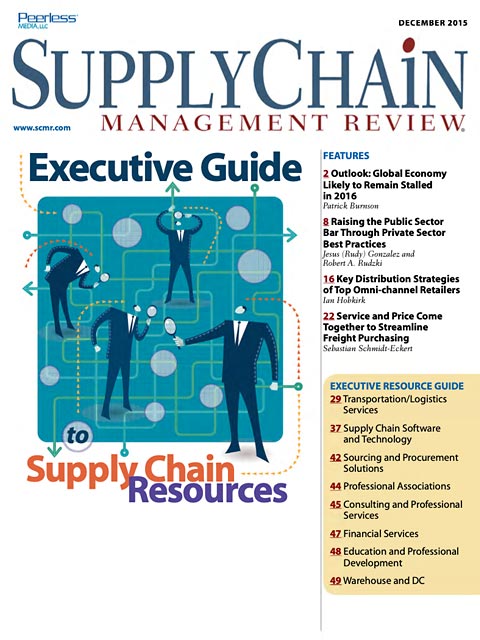Sorry, but your login has failed. Please recheck your login information and resubmit. If your subscription has expired, renew here.
December 2015
It’s December, and time once again for our annual Executive Guide to Supply Chain Resources. This is a comprehensive guide to services, products, and educational opportunities targeted specifically to supply chain professionals. The editors at Supply Chain Management Review wish all of our readers a successful year to come. Browse this issue archive.Need Help? Contact customer service 847-559-7581 More options
To streamline their operations, many organizations are looking to outsource activities that do not need to be handled in-house. The procurement function can be a focus of outsourcing efforts if the organization determines that certain routine activities fall into this category. The types of activities can vary by organization, but in general they include tasks such as developing and executing simple contracts that involve little negotiation and are not integral to the organization’s overall business strategy. For many organizations, outsourcing presents a win-win—the organization frees up employees to focus on more strategic duties while maintaining some control over its procurement activities.
APQC’s Open Standards Benchmarking data in procurement indicates that just under 30 percent of responding organizations have initiated the outsourcing of non-strategic activities in their procurement functions (Exhibit 1). Twelve percent of responding organizations plan to invest in such programs within the next two years, meaning that 40 percent of organizations in APQC’s data find the idea of outsourcing more routine activities appealing for their procurement functions.
As part of its research, APQC compared the procurement performance of organizations that currently outsource non-strategic procurement activities against the performance of organizations that do not currently outsource. The results indicate that organizations outsourcing more routine procurement activities adopt more mature procurement practices than organizations that do not outsource. However, these organizations also have slightly higher costs associated with overall procurement processes, as well as with activities specifically related to ordering materials and services.
 |
This complete article is available to subscribers
only. Click on Log In Now at the top of this article for full access. Or, Start your PLUS+ subscription for instant access. |
SC
MR
Sorry, but your login has failed. Please recheck your login information and resubmit. If your subscription has expired, renew here.
December 2015
It’s December, and time once again for our annual Executive Guide to Supply Chain Resources. This is a comprehensive guide to services, products, and educational opportunities targeted specifically to supply chain… Browse this issue archive. Access your online digital edition. Download a PDF file of the December 2015 issue.
 |
Download Article PDF |
To streamline their operations, many organizations are looking to outsource activities that do not need to be handled in-house. The procurement function can be a focus of outsourcing efforts if the organization determines that certain routine activities fall into this category. The types of activities can vary by organization, but in general they include tasks such as developing and executing simple contracts that involve little negotiation and are not integral to the organization's overall business strategy. For many organizations, outsourcing presents a win-win—the organization frees up employees to focus on more strategic duties while maintaining some control over its procurement activities.
APQC's Open Standards Benchmarking data in procurement indicates that just under 30 percent of responding organizations have initiated the outsourcing of non-strategic activities in their procurement functions (Exhibit 1). Twelve percent of responding organizations plan to invest in such programs within the next two years, meaning that 40 percent of organizations in APQC's data find the idea of outsourcing more routine activities appealing for their procurement functions.
As part of its research, APQC compared the procurement performance of organizations that currently outsource non-strategic procurement activities against the performance of organizations that do not currently outsource. The results indicate that organizations outsourcing more routine procurement activities adopt more mature procurement practices than organizations that do not outsource. However, these organizations also have slightly higher costs associated with overall procurement processes, as well as with activities specifically related to ordering materials and services.
 |
SUBSCRIBERS: Click here to download PDF of the full article. |
SC
MR

Latest Supply Chain News
- Few executives believe their supply chains can respond quickly to disruptions
- Technology’s role in mending supply chain fragility after recent disruptions
- Tech investments bring revenue increases, survey finds
- Survey reveals strategies for addressing supply chain, logistics labor shortages
- Israel, Ukraine aid package to increase pressure on aerospace and defense supply chains
- More News
Latest Podcast

 Explore
Explore
Topics
Latest Supply Chain News
- Few executives believe their supply chains can respond quickly to disruptions
- Technology’s role in mending supply chain fragility after recent disruptions
- Tech investments bring revenue increases, survey finds
- Survey reveals strategies for addressing supply chain, logistics labor shortages
- Israel, Ukraine aid package to increase pressure on aerospace and defense supply chains
- How CPG brands can deliver on supplier diversity promises
- More latest news
Latest Resources

Subscribe

Supply Chain Management Review delivers the best industry content.

Editors’ Picks





